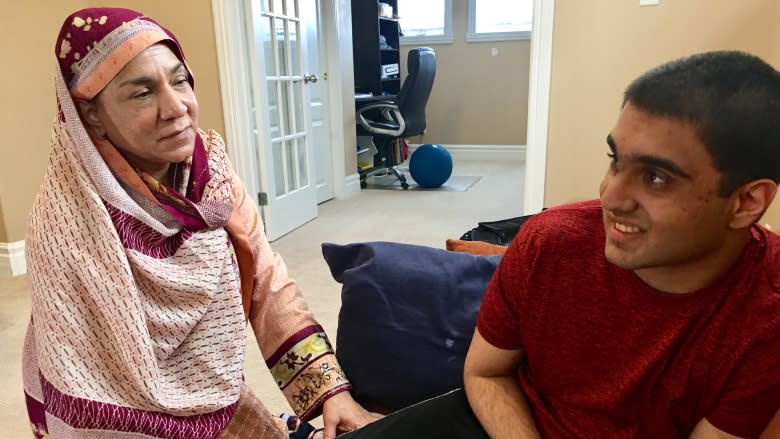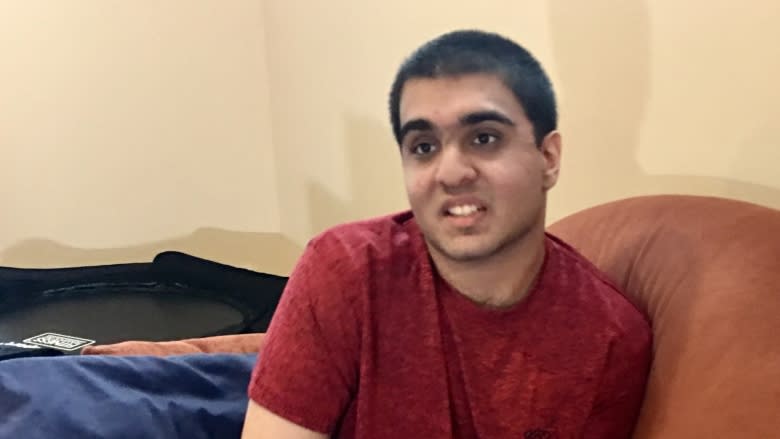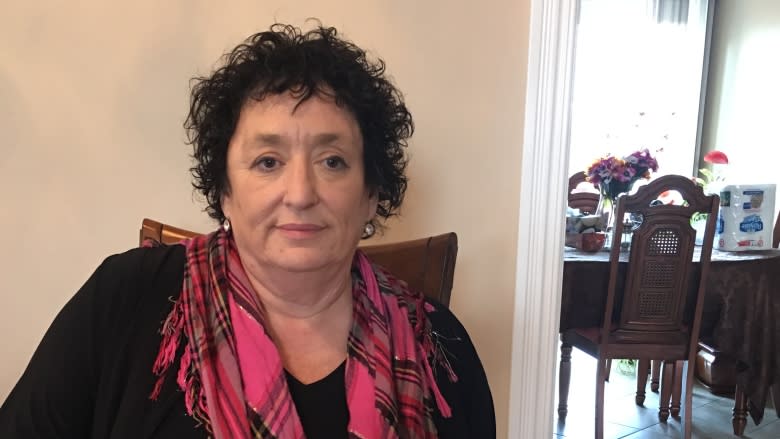Why this 16-year-old autistic teenager can't attend school and his mother is desperate for help
Abdullah Yar Khan is 16 years old, six feet tall and weighs 200 pounds. He doesn't speak, he's not toilet trained and he is getting increasingly aggressive.
These days, his mother, Shabana Shahab, is his primary caregiver.
"He has no life. My son is alive but without life," said Shahab. "As a parent, it's so terrible. He is totally dependent on me. I give him showers. I feed him. He needs 24-hour personal support and supervision. I don't have family members here, only my husband."
Excluded from school
Up until six months ago, Yar Khan attended Holy Names Catholic High School in Windsor, Ont.
Shahab told CBC News he was excluded from attending in November 2016 after her son hit an educational assistant.
"He gets aggressive because he's not able to communicate his needs," she said, which can be common among severely autistic people, according to experts.
The Windsor-Essex Catholic District School Board could only confirm exclusions are a last resort. The Ministry of Education does not track exclusions at this time.
Clinically depressed
Shahab has access to respite help, but not during school hours.
"There's no place for our kid. Our life is like a living hell," said Shahab. "We are getting older. My son is getting bigger. He needs two people for personal care. We face all these challenges alone."
Because of her son's size and aggression, Shahab can't take her son outside by herself. She's afraid he will act up, or worse, walk into traffic.
Recently, Yar Khan was diagnosed with clinical depression.
"He stopped eating, laying down in the room until 2 p.m. He looks very, very sad," Shahab said. "He lays down on the couch because we do not have enough support to take him in the community."
While her son is now on anti-depressants, Shahab said that does not address the bigger issue.
'They need help'
"I wish there's something in the community where he can go, where I feel he is safe and people are trained," she said. "He really needs trained staff, a structured environment. The government should make changes because this is not only my story. This is the story of so many people who are living the same life."
Michelle Helou, president of Autism Services Inc. of Windsor and Essex County, says the lack of services and funding affects families across the province.
"If they cannot stay in school, there's no place to put them," said the mom, who has an autistic 19-year-old son, Noah. "There's no program out there geared for their high needs."
Helou credits her son's success in high school to a program that helped severely autistic children transition back into schools in the community.
He spent three years learning the skills to return to school. Funding for the program at Maryvale Adolescent and Family Services in Windsor ran out shortly after Noah left.
"Now, all of a sudden your child is home 24/7," said Helou. "You're not getting a break. Who's going to watch after your child? Parents have bills to pay. It can cause a lot of stress."
A respite worker who took care of Yar Khan last summer said she's worried about the family.
"The stress of the family is extreme," she said. "Both of his parents are of ill health. They're really left high and dry in a lot of ways."
New program in June
Windsor-West MPP Lisa Gretzky, who was education critic, said the government ministries involved in creating support for young autistic people need to be "more coordinated." She also explained how schools need more funding to accommodate students like Yar Khan, and there needs to be programs in the community if a student is excluded.
When asked about the support, Michael Coteau, the minister of children and youth services, said, "The one thing I've heard loud and clear from parents in Ontario is the system is overwhelming and complex and finding those resources is sometimes difficult. My job is to make sure we build better entry points that allow more flexibility and guidance to where they can get those services."
The province is rolling out a new autism program in June, spending half a billion dollars over five years to improve and expand services for young people with autism, though there are few details about if and how it will help families like Shahab's.
'A day and night fight'
In the meantime, Shahab continues to care for her teenage son, with that sparse support from respite services.
"What really gets my heart is the regression I'm seeing with the child," said Jones, who cared for Shahab's son last year. "The child is losing what little they have in their lives. To be closed and encased like this, it's a crime. It's debilitating. Their life is dwindling away."
Shahab said she never had sleep issues in her life, but since the exclusion six months ago, she started suffering from insomnia. Her husband had a heart attack last June and she was unable to be with him as he recovered in hospital. And she's worried about what will happen to her son if they are both sick. Or worse.
"It's a day and night fight," she said






